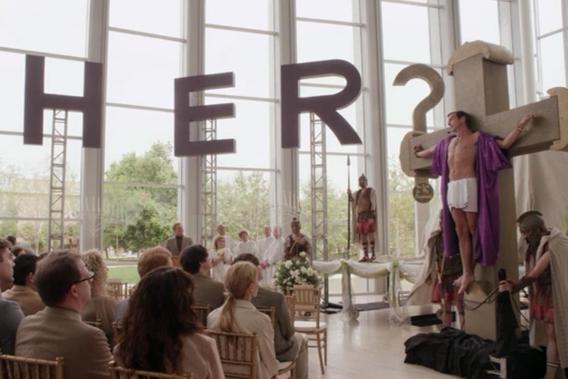If the laugh track is the most derided television comedy trope, second place probably belongs to the catchphrase. The tradition goes back to vaudeville, when audiences would wait breathlessly for a comedian or comic character’s verbal signature, erupting in laughter when Joe Penner said, “Wanna buy a duck?” or Jack Pearl, “Vas you dere, Sharlie?” TV comedy picked this move up early on, forming an unbroken line of lines, from Jackie Gleason (“To the moon”) to Phil Silvers (“Glad to see ya”) to Sergeant Schultz (“I know nothing!”) to Maxwell Smart (“Sorry about that, Chief”) to the Fonz (“Ayyy”) up through the many catchphrase-spouting characters of Saturday Night Live (“We are two wild and crazy guys,” “You look mahvelous,” and dozens more).*
Post-Mary Tyler Moore, the modern sitcom moved away from italicized, winking catchphrases to something a little more organic, lines that struck a chord in part because they seemed to emanate more naturally from the character who spoke them. Often, for whatever reason, these took the form of questions. Bob Newhart’s “You want to go with that?” or Archie Bunker’s “Will you stifle?”, Gary Coleman’s “What you talkin’ about, Willis?” and Joey Tribbiani’s “How you doin’?” The old-school catchphrase lived on mainly as an object of mockery, as in “Are you ‘avin’ a laugh?” from the execrable, laugh-tracked comedy-within-a-comedy on Ricky Gervais’s series Extras. The Simpsons, which features a number of modern-sitcom catchphrases (“D’oh!” and “Excellent” being perhaps the most popular), ended an episode with the thoughtful Lisa’s refusal to adopt one of her own. On the American Office, “That’s what she said” showed again and again that Michael Scott had a shall we say hackneyed sense of humor.
Seinfeld, meanwhile, took catchphrases to another level. In addition to nothing, the show sometimes seemed to be about catchphrases: “yadda yadda yadda,” “spongeworthy,” “No soup for you!”, “Not that there’s anything wrong with that,” and so on. For Jerry, Elaine, and the rest, odd or uncomfortable social phenomena were naming opportunities, like new animals for Adam.
Then came Arrested Development, whose use of catchphrases is nothing less than transformative. In NPR’s amazing graphic charting the running gags on the show, “Previously, on Arrested Development,” dozens and dozens of the entries are words and phrases that come up again and again in the original three seasons and are called back in the fourth, from “I’ve made a huge mistake” to “Steve Holt!” to “It’s an illusion, Michael.”
The shock-and-awe frequency is a key aspect of the way creator Mitchell Hurwitz and his fellow writers deploy these verbal missiles. Most viewers probably miss most of them, but when you do catch the reference, you get a special jolt of pleasure. That actually suggests one of the less fabulous aspects of Arrested—the self-congratulatory fanboy insiderism the show and its followers are sometimes prone to. But it’s not as exclusionary as it might be, because the inside jokes fly by so fast that when we miss them, we don’t even realize it. No harm, no foul.
And anyway, that’s a bit of a sideshow. The main thing Arrested has done is take the traditional character-based catchphrase and make it fungible. It evolves and shape-shifts and gets used by different characters and in different situations, episode to episode and season to season, gathering comic and sometimes revelatory power in the process. Season 4’s seventh episode, “Colony Collapse,” had some pretty epic examples of this. (Read no further if you haven’t seen it yet and want nothing spoiled.) Gob Bluth (Will Arnett) has experienced a series of unfortunate events befitting his homophonic namesake, the biblical Job, not least a love connection with his nephew’s former girlfriend, Ann, aka “Egg,” aka “her?” In a tour-de-force scene, Arnett breaks down and blubbers, his power of speech limited to fragments of catchphrases of his former cocky self, “Come on!” and “This is an [X]-dollar suit” (the latter made more poignant by the fact that he is actually wearing Ann’s bathrobe). As Vulture recapper Zach Dionne aptly put it, “Gob’s brain is short-circuiting with Arrested Development references.”
Gob can’t get the words out that he wants to break up with Ann. But then she says she thinks they should end it. He is so grateful that he blurts out one of his niece Maeby’s catchphrases, “Marry me!” Which Ann takes literally. And that’s how they end up at the altar in her evangelical family’s chapel, with the word “HER?” above them in capital letters. It’s actually the acronym for the church of Holy Eternal Rapture. And if you look closely, you see that the thing after the “R” isn’t a question mark but a shepherd’s crook, and that in the circle under it is written, “The Lord Is My Shepherd.”
And that’s the way you work a catchphrase!
* Correction, June 4: This post originally misstated the rank of fictional character Hans Schultz. He was a sergeant, not a colonel.
